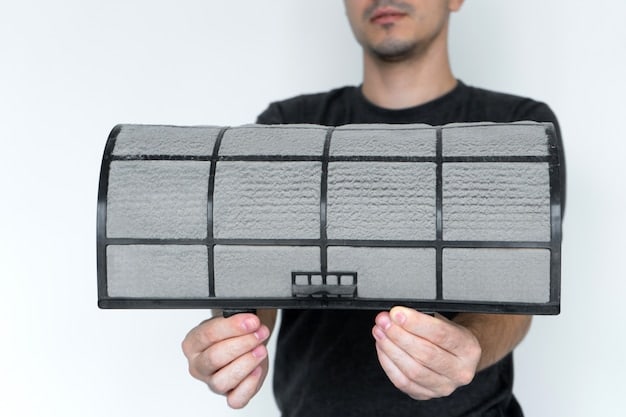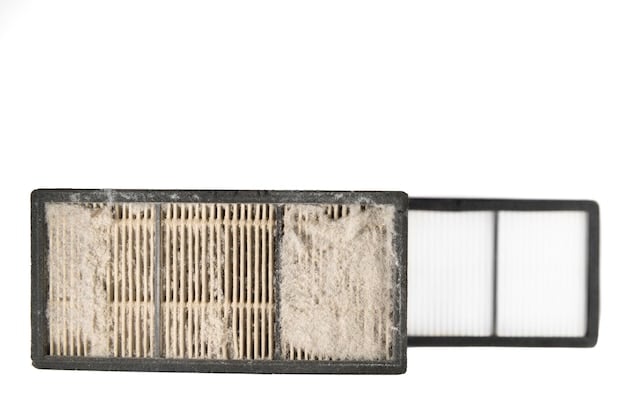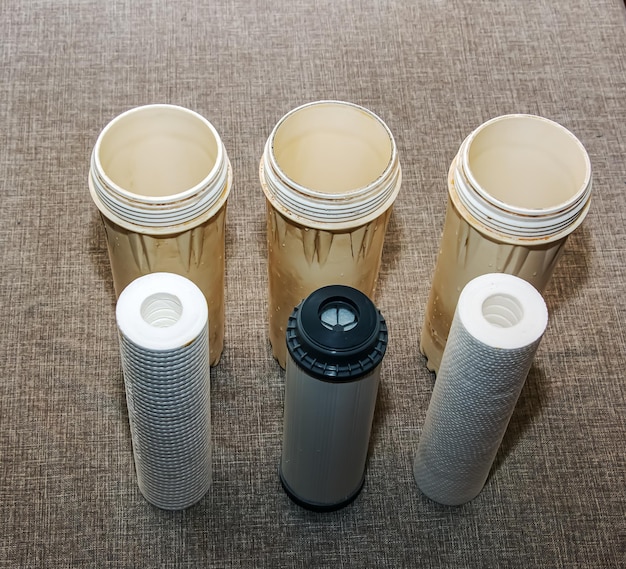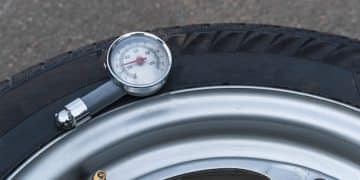Air Filter Replacement: Boost Your Car’s Performance by 15%

Replacing your car’s air filter can significantly improve its performance. A clean air filter ensures optimal airflow to the engine, potentially increasing horsepower by up to 15% and enhancing fuel efficiency.
Is your car not performing as efficiently as it used to? One simple fix could dramatically improve its performance: replacing your air filter replacement: how a clean air filter can improve your car’s performance by 15%. Let’s explore how this easy maintenance task can revitalize your driving experience.
Why Air Filter Replacement Matters for Your Car
The engine air filter is a crucial component that protects your engine from harmful contaminants. Over time, it becomes clogged with dirt, dust, and debris, restricting airflow. This restriction can lead to a variety of performance issues.
Understanding the functions of air filter is very important because it impacts several aspects of your car’s performance and longevity.
The Role of the Air Filter
The primary role of the air filter is to prevent abrasive particles from entering your engine’s cylinders. These particles can cause significant wear and tear, reducing the engine’s lifespan and performance. A clean air filter ensures that only clean air enters the engine, promoting efficient combustion.
Consequences of a Dirty Air Filter
When an air filter becomes excessively dirty, it restricts airflow, leading to an imbalance in the air-fuel mixture. This can cause several problems, including reduced horsepower, decreased fuel efficiency, and increased emissions. Ignoring a dirty air filter can lead to more severe engine damage over time.
- Reduced Engine Performance: A clogged air filter restricts airflow, making the engine work harder.
- Lower Fuel Efficiency: An inefficient air-fuel mixture leads to increased fuel consumption.
- Increased Emissions: Poor combustion results in higher levels of harmful pollutants.
Regular air filter replacement is essential to maintain your car’s performance and extend its lifespan. By ensuring a clean and free-flowing air supply, you can optimize your engine’s efficiency and reduce the risk of costly repairs.
How a Clean Air Filter Boosts Engine Performance
A clean air filter can have a surprising impact on your car’s engine performance. By ensuring an adequate supply of clean air, it optimizes the combustion process, leading to noticeable improvements in horsepower, acceleration, and overall responsiveness.
Many car owners report a significant rise to performance after doing the replacements within the ideal time. See the items below and learn more about the benefits.

Increasing Horsepower
When your engine receives the correct amount of clean air, it can burn fuel more efficiently, resulting in increased horsepower. Studies have shown that a clean air filter can improve horsepower by up to 15% in some vehicles. This enhancement translates to quicker acceleration and improved towing capacity.
Improving Fuel Efficiency
A clean air filter allows the engine to operate at its optimal air-fuel ratio, maximizing fuel efficiency. By reducing the engine’s workload, you can achieve better gas mileage and save money at the pump. Regular air filter replacements can significantly contribute to long-term fuel savings.
Replacing your air filter can lead to better engine combustion and great savings at the gas station. So schedule regular checks to your car’s air filter.
Recognizing the Symptoms of a Dirty Air Filter
Knowing when to replace your air filter is crucial for maintaining your car’s performance and fuel efficiency. Several telltale signs indicate that your air filter needs attention. By recognizing these symptoms early, you can prevent potential engine damage and ensure your car runs smoothly.
Most symptoms are easily noted while you are driving. Check out the following indicators of a dirty air filter.
Reduced Fuel Economy
One of the most noticeable symptoms of a dirty air filter is a decline in fuel economy. As the engine struggles to draw in enough air, it consumes more fuel to maintain performance, leading to lower gas mileage. If you find yourself filling up more frequently, your air filter could be the culprit.
Decreased Acceleration
A dirty air filter can restrict the engine’s ability to accelerate quickly. When you press the gas pedal, the engine may hesitate or feel sluggish. This lack of responsiveness is a sign that the engine isn’t receiving the necessary air for optimal combustion.
Unusual Engine Noises
A clogged air filter can cause the engine to make unusual noises, such as coughing or sputtering. These noises are often due to an improper air-fuel mixture, resulting from insufficient airflow. If you hear unusual sounds coming from your engine, it’s essential to investigate the air filter.
- Poor Engine Performance: Noticeable hesitations or sluggishness when accelerating.
- Check Engine Light: A dirty air filter can trigger the check engine light in some vehicles.
- Visually Dirty Filter: If the filter appears dark and clogged with debris, it needs replacement.
By staying vigilant and recognizing these symptoms, you can proactively address a dirty air filter and maintain your car’s performance and fuel efficiency. Regular inspections can help you catch issues early and prevent more significant problems down the road.
Step-by-Step Guide to Replacing Your Air Filter
Replacing your car’s air filter is a straightforward maintenance task that you can easily do at home. With a few basic tools and a little guidance, you can save money on labor costs and ensure your engine is breathing clean air. This step-by-step guide will walk you through the process.
Make sure you have proper tools and equipments before starting the work. Follow the instructions below.
Gather Your Supplies
Before you begin, gather the necessary supplies. You’ll need a new air filter that matches your car’s make and model, a screwdriver (usually Phillips or flathead), and a pair of gloves to keep your hands clean. Having a shop towel handy can also be useful.
Locate the Air Filter Housing
The air filter housing is typically located under the hood, near the engine. Consult your car’s owner’s manual for the exact location. The housing is usually a black plastic box with a lid secured by clips or screws.
Remove the Old Air Filter
Open the air filter housing by unclipping or unscrewing the lid. Carefully remove the old air filter, noting its orientation so you can install the new one correctly. Examine the old filter for dirt and debris to gauge how well it was functioning.
- Open the Air Filter Housing: Use a screwdriver or clips to open the housing.
- Remove the Old Filter: Carefully lift out the old filter, noting its position.
- Clean the Housing: Wipe out any dirt or debris from the air filter housing.
Once the air filter is done, you are off to more benefits for your car and more savings as well. Make sure you do the inspection well to avoid issues.
Choosing the Right Air Filter for Your Car
Selecting the correct air filter for your car is essential to ensure optimal engine protection and performance. With various types of air filters available, it’s important to understand their differences and choose the one that best suits your vehicle’s needs. Here’s a guide to help you make the right choice.
If you are on a budget or would like to have more high end air filters, make sure to see your options before replacing your cars air filter.

Paper Air Filters
Paper air filters are the most common and affordable option. They provide good filtration and are suitable for everyday driving conditions. Paper filters are typically disposable and should be replaced at regular intervals as recommended by your car’s manufacturer.
Foam Air Filters
Foam air filters offer a balance between filtration and airflow. They are washable and reusable, making them a more sustainable option. Foam filters are often used in off-road vehicles or in dusty environments where frequent filter changes are necessary.
Cotton Gauze Air Filters
Cotton gauze air filters are designed for high-performance vehicles. They provide superior airflow, which can enhance horsepower and acceleration. These filters are washable and reusable but require regular oiling to maintain their filtration efficiency.
Choosing the best air filter might require some research but know that benefits outweigh the effort and the long run savings and performance that you may get.
Maintaining Your Car’s Air Filter: Best Practices
Proper maintenance of your car’s air filter is crucial for ensuring its longevity and effectiveness. Following best practices can help you keep your engine protected and maximize its performance. Here are some tips for maintaining your air filter:
The air filter is just one of the many aspects of car maintenance. Take importance to all of them to save a lot of troubles and expenses.
Regular Inspections
Inspect your air filter regularly, at least every 12,000 to 15,000 miles, or more frequently if you drive in dusty or polluted conditions. A visual inspection can reveal whether the filter is dirty or clogged, indicating the need for replacement.
Proper Cleaning
If you’re using a washable air filter, such as a foam or cotton gauze filter, clean it according to the manufacturer’s instructions. Use a mild detergent and water to remove dirt and debris, and allow the filter to dry completely before re-oiling (if applicable) and reinstalling it.
Timely Replacement
Replace your air filter at the recommended intervals specified in your car’s owner’s manual. Even if the filter doesn’t appear overly dirty, it’s best to replace it to ensure optimal engine protection and performance. Timely replacement can prevent potential engine damage and maintain fuel efficiency.
- Check Regularly: Inspect the air filter every 12,000 to 15,000 miles.
- Clean Washable Filters: Use mild detergent and water to clean reusable filters.
- Replace on Time: Follow the manufacturer’s recommended replacement intervals.
Maintaining the air filter has several benefits to your car performance. So value your engine and save money by scheduling regular maintenance.
| Key Point | Brief Description |
|---|---|
| 💨 Engine Performance | A clean filter improves airflow, boosting horsepower and acceleration. |
| ⛽ Fuel Efficiency | Replacing the filter ensures efficient fuel combustion and better gas mileage. |
| 🛡️ Engine Protection | A clean filter prevents harmful particles from damaging engine components. |
| 🛠️ Easy Maintenance | Air filter replacement is a simple DIY task that saves on labor costs. |
Frequently Asked Questions (FAQ)
▼
The general recommendation is to replace your air filter every 12,000 to 15,000 miles. However, if you drive in dusty or polluted conditions, you may need to replace it more frequently.
▼
Yes, a dirty air filter can significantly impact your car’s performance. It restricts airflow, leading to reduced horsepower, decreased fuel efficiency, and increased emissions. Regularly replacing it can help maintain optimal engine operation.
▼
Paper air filters are suitable for most cars and provide good filtration. Foam and cotton gauze filters are washable and reusable, offering a balance of filtration and airflow. Choose based on your driving conditions and performance needs.
▼
No, replacing the air filter is a simple DIY task that most car owners can do at home. You’ll need a new filter, a screwdriver, and a few minutes. Consult your owner’s manual for the filter’s location and specific instructions.
▼
Yes, a clean air filter allows the engine to operate at its optimal air-fuel ratio, maximizing fuel efficiency. By reducing the engine’s workload, you can achieve better gas mileage and save money at the pump.
Conclusion
In conclusion, regular air filter replacement: how a clean air filter can improve your car’s performance by 15% is crucial for maintaining your car’s performance, fuel efficiency, and engine health. By understanding the symptoms of a dirty air filter and following best maintenance practices, you can ensure your vehicle runs smoothly and efficiently for years to come. Make checking and replacing your air filter a priority for a better driving experience and long term savings.





